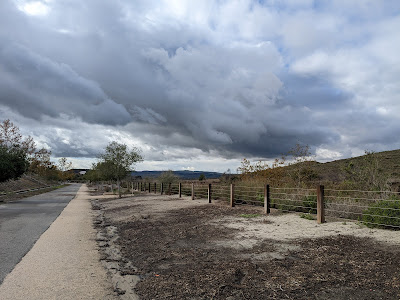Gravity's Rainbow and Resignation
Cactus wrens nest in uninviting places. Between paddles of prickly pears, they tangle a nest together and stay forever, defending their territory. Even though the bird's national population is healthy, numbers in southern California have dropped enough to alarm conservationists. Fires and housing developments have eaten up prickly pear habitats in Orange County, burning up nesting potential.
There's a trail near my neighborhood that gets a
thorough maintenance once a season when conservation crews come through
to attend the Prickly Pear transplanted there. Efforts to create vast webs of the cactus throughout Orange County have helped the cactus wrens. Young birds, who need to see the next plant over to know it exists, must be within eyesight of new groves to settle down.
I did not enjoy Gravity's Rainbow. After each of the book's sixty-plus episodes I was frustrated enough to feel certain I was done. But after a while, seduced by the cleverness, the irony, the hope that a character arc
might land rather than coil back on itself, suspended, forever, I came back. I convinced myself I could see something desirable, just there over the next bluff.
It was no surprise to discover the 1974 Pulitzer Prize fiction committee voted for the book. Also no surprise, the Pulitzer Advisory Board vetoed the vote, calling the novel "unreadable" and "overwritten." The polarization experienced by the folks at Pulitzer was akin to my internal pull.
*Spoilers Follow*
Thomas Pynchon chained me to the page. My mind or feelings were not permitted to wander. In fact, in the whopping 305,000 words, only two sentences in the book released me from analysis long enough for a giggle. "Yes, there is something sadistic about recipes with surprise in the title," the narrative voice opines after a tangent on cooking. And, during one of the many swirling moments dedicated to Namibian and American colonization, "Colonies are the outhouses of the European soul." Twenty words out of 305,000 allowed me to float from the text.
More or less, Gravity's Rainbow follows Tyrone Slothrop, an American Army Lieutenant, through Europe in the final throes of World War Two. The narration is a loose third that mostly accesses Slothrop, but that sometimes slips to other characters or places.
Slothrop's "hard-ons" portend imminent rocket fall. His arousal precedes a trail of destruction. Though Slothrop is unaware of the relationship between his sex life and devastation, several interested parties have made the connection. He is constantly surveilled and accused of paranoia by the people around him, most of whom are planted. His sexual encounters are of great interest to the worlds of science and national security.
We learn, eventually, confusingly, that in childhood Slothrop is conditioned to become sexually aroused by some stimulus we never learn. The stimulus is never tied to anything specific that relates to the rockets, though we can assume. We get a glimmer of backstory in learning that Slothrop's father offered him up for experimentation, traded him to decrease debt.
The cactus wren trail near my house tempted me the other day. It was a clear day, bright and calm, and I fancied running the packed dirt between the prickly pear groves. Halfway down the trail, though, the way was overgrown with wild mustard. A racket of bright lime stem and bright yellow blooms overtook the trail.
To complete this loop, I would need to do a lot of extra work. It would be slow and sometimes painful going.
I turned around. The world is full of beautiful trails, ready for the taking.
I borrowed this book from my library via Libby. It's 37hours and 21minutes and narrated by George Guidall.



Comments
Post a Comment